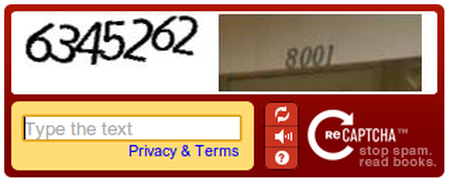October 28, 2013 report
reCAPTCHA eases up on the human eye

(Phys.org) —Google, assuming you are human and reading this, wants you to know that CAPTCHAs are more readable. There will be easier days ahead than having to put your face against the screen, struggling to figure out if the string wants you to key in a v and u or a single w, or if an indescribable shape is really an exotic r. For humans, deciphering a CAPTCHA string may get easier but a tougher time is ahead for bots because their CAPTCHAs will be designed to stop the bots from getting through. The new, easier reCAPTCHAs are numbers. On Friday, a blog post from Google's Vinay Shet, Product Manager, reCAPTCHA, said that "Humans find numeric CAPTCHAs significantly easier to solve than those containing arbitrary text and achieve nearly perfect pass rates on them. So with our new system, you'll encounter CAPTCHAs that are a breeze to solve."
Google's new update involves different classes of CAPTCHAs for different kinds of users. "This multi-faceted approach allows us to determine whether a potential user is actually a human or not," he wrote. Shet said more about the good news. "The distorted letters serve less as a test of humanity and more as a medium of engagement to elicit a broad range of cues that characterize humans and bots." The team members behind reCAPTCHA nonetheless maintained their focus on how to distinguish legitimate users from automated software. "The updated system uses advanced risk analysis techniques, said Shet, "actively considering the user's entire engagement with the CAPTCHA—before, during and after they interact with it."
Their work is not over. "While we've already made significant advancements to reCAPTCHA technology, we'll have even more to report on in the next few months, so stay tuned," he stated. reCAPTCHA has its roots at Carnegie Mellon, not Google, but Google acquired reCAPTCHA in 2009; roots actually go back further to Carnegie Mellon's CAPTCHA which stands for Completely Automated Public Turing test to tell Computers and Humans Apart. CAPTCHA was developed as a security tool, showing distorted textual images, to be used to ward off bot attacks and spammers. One encounters CAPTCHAs on sign-up pages. The reCAPTCHA Project was built on the original concept and acquired by Google in 2009.
Google defines present-day reCAPTCHA as a Web service and notes that those who run web sites will find adoption is easy, as simple as adding a few lines of code. "For some applications (such as Wordpress and Mediawiki), we have plugins that allow you to use reCAPTCHA without writing any code," according to the reCAPTCHA site. "We generate and check the distorted images, so you don't need to run costly image generation programs." Google also positions reCAPTCHA as a free CAPTCHA service "that helps to digitize books, newspapers and old time radio shows." To help along digitizing books, reCAPTCHA sends words that cannot be read by computers to the Web in the form of CAPTCHAs for humans to decipher. Currently, according to the reCAPTCHA web site, "we are helping to digitize old editions of The New York Times and books from Google Books."
More information:
www.google.com/recaptcha/whyrecaptcha
googleonlinesecurity.blogspot. … ier-but-only-if.html
© 2013 Phys.org




















